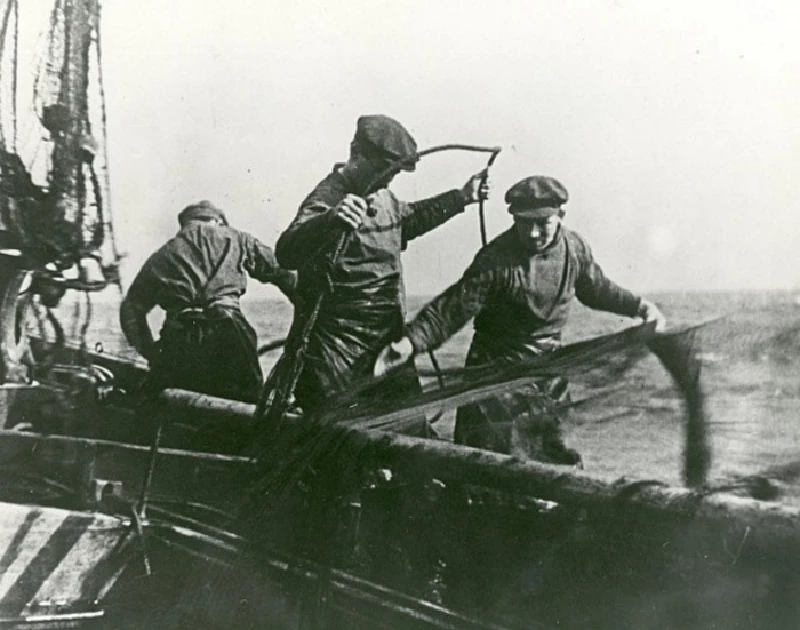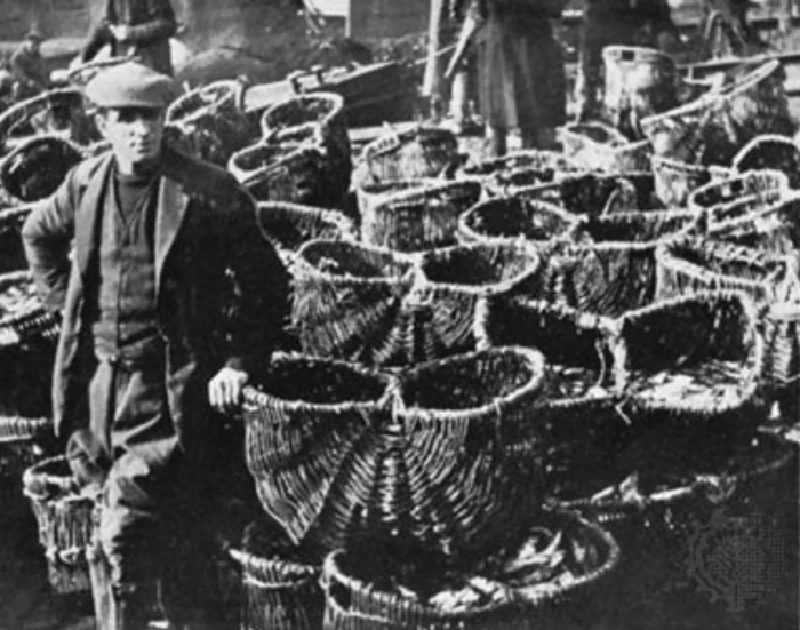Miscellaneous - Profile
by Owen Peters
published: 25 / 8 / 2015

intro
Live musical scores to silent films are maybe a new experience to Owen Peters, but he soon finds out via various interviews around the subject that it is an expanding concept
When I’m out walking in my mind having fought through rugged terrain and unused pathways, I think “I bet not many people ventured this far,” as I keep out a watchful eye for bears and snakes. My illusions for this are, however, often shattered when I am then confronted with a sign saying, “Nearest toilets 100 yards." I lapsed into a similar thought process when watching and listening Field Music perform their score to John Grierson’s 1929 film 'Drifters' at Belfast’s Queen’s Cinema. Probably not many folks would have seen a silent film (other than on TV) with an accompanying score played live. Many bands and artists have worked on silent movie projects. I was intrigued to find out more. Are silent movie arrangements just for the hardy few, or is there a viable commercial market? Once Field Music’s short tour was completed, I asked band member Peter Brewis for his thoughts on the experience. “Setting up the tour to play 'Drifters' was a one-off event for us. We really enjoyed the process and challenge of arrangement and production. At present the format will only capture a limited audience. It’s clear some of those attending turn up just to see the film. To some degree our score was of secondary importance, almost an imposition. I’d suggest better advertising and promotion would help artists and cinemas improve audience numbers. I hope the concept develops. We certainly enjoyed putting the arrangement together and playing live to this particular silent film.” Mike Hammond is lead guitarist with classic Americana skiffle band the Dodge Brothers and Associate Professor in Film at the University of Southampton. He’s in somewhat of a unique position, lecturing on silent movies and playing with a band live to cinema and festival audiences. “We (the Dodge Brothers) have played to silent movies for many years. It began in 2007. Our first silent movie was William S. Hart’s 'White Hart' (1921) for the British Film Festival,” he recalls. They’ve played some of the finest venues around from the Barbican, the National Film Theatre to the National Media Museum in Bradford. “I’d like to think in some way we fly the flag for silent cinema,” he says. Although other bands have followed (Minima this year) the Dodge Brothers were the first band to play live to a silent film at Glastonbury in 2014. Hammond takes up the story. “We played William Wellman’s 1928 classic 'Beggars for Life' in the Pilton Palais cinema tent. Everything was a bit last minute. At times we had to compete with the acoustic tent. But, eh, who would have believed it, a silent film score at Glastonbury, and we did it first,” he says with undoubted pride. I ask if he believes there is any motivation to develop the scoring of silent movies from a commercial perspective? “Now there’s a question,” I hear him chuckle. “Many bands have tried, some as an intentional one off. Stewart Copeland composed a soundtrack to MGM’s 1925 silent epic 'Ben Hur'. I think that was around 2010, which from all accounts was a great success.” Not all artists' arrangements meet with Hammond’s approval. “Giorgio Moroder's soundtrack to 'Metropolis' directed by Fritz Lang in 1927 didn’t work for me. The musical choices of Freddie Mercury, Pat Benatar, Adam Ant, Jon Anderson took over the movie rather than being an accompaniment.” Some may disagree but at least Moroder opened up debate on music and silent films. Masterpiece or monstrosity were typical of comments made by divided film audiences. Hammond adds, “When 'The Artist' won Academy Award for Best Picture in 2012, we thought the public would take a broader interest in the silent genre. Unfortunately it didn’t happen with any momentum. It sadly became a very good one off film.” Those artists I’ve spoken with echo Hammond's musical view - a film score shouldn’t overshadow the context and delivery of the film itself. Audience only hear the end product. So how is a score put together? The Elysian Quartet, along with producers Max De Wardener and Ed Finnis, offer a rare insight into how an arrangement is constructed. In 2011, Sergei Eisenstein’s silent film 'The General Line' (1929) was screened with a score for the first time. It premiered at the BFI 'Kino' season of Russian cinema in 2011. Eisenstein had failed to find funding for a soundtrack when making the film, but left a set of notes intended as a guide for a composed score. Working from his original guidelines we witness the composition process in full flow, although in some cases with disagreements. Everyone knows it’s important to get the tone of a cows “mooing” right. Right? http://explore.bfi.org.uk/4fc75e5342265 Laura Moody, the cellist with the Elysian Quartet, tells me, “We’ve worked on various silent film scores over the years. Mary Pickford’s comedy “My Best Girl'(1927) premiered at the Bird's Eye View Film Festival at the BFI 2008, repeated by the same festival at Kings Place in 2010 and performed in various locations on tour. 'The Great White Silence' (Composed by Simon Fisher Turner with the Elysian Quartet) premiered at BFI London Film Festival 2010 and toured internationally. We also put an arrangement together for the 1920 film 'Helen of Four Gates' which premiered at the Riverhouse Barn Walton on Thames in 2012.” I find silent films evocative, capturing a rich diverse picture of culture, history and social etiquette. Most people’s introduction to silent movies is two fold. As an adolescent they would have been viewed on a home TV, its theme comedy. Immediately Laurel and Hardy, Charlie Chaplin, Harold Lloyd, Buster Keaton etc spring to mind, imprinted in our psyche over those formative years. Silent films, however, caught the industrial revolution with unerring, maybe accidental accuracy. Those working class communities - miners, steelworkers, millworkers, fishermen - are caught on celluloid at work and play. 'Drifters”' highlights one such community living and working on and from the sea, and its daily rigours of fish being caught, gutted, bought and sold, ice packed, and transported to shops and restaurants around the UK. 'Helen of Four Gates' was a blockbuster of its time. Director Cecil Hepworth shot the film on location near to Hebden Bridge along the Pennine Moors. Not only did it capture the stunning backdrop of West Yorkshire, it explored love, entrapment, jealousy. It was a true reflection of those unable to escape their upbringing and generational conformity. The film was thought lost forever having not been seen for over eighty years, until it was found in Montreal. In 2010 it was again shown in its original setting of Hebden Bridge. These are the type of stories which make silent films so personal and historically educational. Moody recalls, “Our soundtracks were devised through experimentation and improvisation than “composed” in the traditional sense, even when working in collaboration with other composers. They tended to take the form of planned improvisations where scene by scene we would work out what kind of sound world, harmonic progression or other musical/sonic ideas would feature. While there were moments or interludes that were more set, predominantly we would leave ourselves open to respond to the film spontaneously in the performance. In this way the soundtracks created a wonderful feeling of communal experience with the audience each new performance. It was truly one of the most satisfying experiences in our time together.” Hammond explains how experience also changed the Dodge Brothers style. “Originally we had cue sheets which indicated who came in when, for how long. As we grew with the films our style became more expressive, spontaneous, playing by ear, what sounded right as a opposed to a set structure. If we play on consecutive nights, it results in no two performances being the same which allows more freedom and expression to our arrangements” The Queen's Cinema Belfast are one of the independent cinemas willing to take a risk in showing silent films. Management and staff (mostly volunteers) confirmed just how difficult it is in getting the commercial aspect right. “To be honest we have very little idea how many people will turn up to watch Field Music/'Drifters'. We would love to show silent films every week but they don’t have the fan base. If we choose the wrong film audiences can be small. I know some of the more established venues in London attract good support when screening silent movies. That has been built up over the years. Staff agree with Mike Hammond’s view on 'The Artist”. “Collectively most people had a view the film would allow a broader base of interest to develop in silent films. It didn’t happen” is one rueful comment. I enjoyed being part of the audience experiencing Field Music scoring 'Drifters” in Belfast, when cinema and music dovetailed together. Whilst there are venues, artists and bands who are keen, passionate, aficionados there isn’t an individual, organisation or sponsor who is currently taking music and silent movies to the next level. Or is there? During September I will sample more silent films and meet with bands and venue managers who are renowned for their association with the silent genre, and I will be asking: What is the commercial future for music and its relationship with silent films?
Picture Gallery:-

most viewed articles
current edition
Carl Ewens - David Bowie 1964 to 1982 On Track: Every Album, Every SongBathers - Photoscapes 1
Colin Blunstone - Thalia Hall, Chicago, 16/7/2025
John McKay - Interview
Armory Show - Interview with Richard Jobson
Visor Fest - Valencia, Spain, 26/9/2025...27/9/2025
Billie Eilish - O2 Arena, London, 10/7/2025
Bathers - Photoscapes 2
Editorial - July 2025
Sir Tim Rice - Interview
previous editions
Heavenly - P.U.N.K. Girl EPOasis - Oasis, Earl's Court, London, 1995
Trudie Myerscough-Harris - Interview
Pixies - Ten Songs That Made Me Love...
Simon Heavisides - Destiny Stopped Screaming: The Life and Times of Adrian Borland
Beautiful South - Ten Songs That Made Me Love...
Prolapse - Interview
Boomtown Rats - Ten Songs That Made Me Love....
Blues and Gospel Train - Manchester, 7th May 1964
Donovan - Ten Songs That Made Me Love...
most viewed reviews
current edition
Amy Macdonald - Is This What You've Been Waiting For?Sick Man of Europe - The Sick Man of Europe
Alice Cooper - The Revenge of Alice Cooper
Phew, Erika Kobayashi,, Dieter Moebius - Radium Girls
Lucy Spraggan - Other Sides of the Moon
Blueboy - 2
Cynthia Erivo - I Forgive You
Davey Woodward - Mumbo in the Jumbo
Lapsley - I'm a Hurricane, I'm a Woman In Love
Philip Jeays - Victoria
Pennyblackmusic Regular Contributors
Adrian Janes
Amanda J. Window
Andrew Twambley
Anthony Dhanendran
Benjamin Howarth
Cila Warncke
Daniel Cressey
Darren Aston
Dastardly
Dave Goodwin
Denzil Watson
Dominic B. Simpson
Eoghan Lyng
Fiona Hutchings
Harry Sherriff
Helen Tipping
Jamie Rowland
John Clarkson
Julie Cruickshank
Kimberly Bright
Lisa Torem
Maarten Schiethart